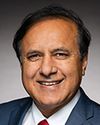Thank you very much, Madam Chair.
Good morning, everyone.
It is a pleasure to be here with you today.
It's becoming a matter of routine that we get to show up, and I really appreciate the conversations we have at this committee.
It's good to be here again this time to present details of the 2022-23 main estimates for Immigration, Refugees and Citizenship Canada.
IRCC remains dedicated to working with the committee to support our immigration, refugee and asylum systems.
We are committed to maintaining Canada as a leading destination of choice for the world’s most talented and skilled people, and as a country known for its dedication to meeting international humanitarian commitments.
As the committee is aware, we plan to continue our efforts to attract record numbers of skilled workers to help our economic recovery from the pandemic. In addition, we're going to continue to prioritize family reunification and offering shelter to the world’s most vulnerable.
In support of these commitments, these main estimates that we are discussing today reflect the total funding of $3.9 billion. This represents a net increase of $654.4 million compared to last year’s main estimates. The most significant additional allocation in the main estimates is $208.8 million for the implementation of the multi-year immigration levels plans.
To ensure that Canada has the workers that it needs to grow our economy and address our labour shortages, our immigration levels plan aims to continue welcoming an increased number of newcomers in order to continue our recovery from the pandemic. Specifically, the additional funding will allow us to resettle totals of 431,645 permanent residents in 2022, and next year we will see 447,055 new permanent residents.
This builds on our previous plan, with an increased focus on supporting our economic resurgence and post-pandemic growth.
The government also remains firmly committed to our humanitarian efforts, including our plan to resettle at least 40,000 Afghan refugees over the next two years.
More than 12,600 Afghan refugees now call Canada home, and we're going to continue working with our partners in the region and using all other means available to secure safe passage for those aiming to leave Afghanistan and for onward travel to Canada. To support this undertaking, the main estimates contain $106.2 million to support the Afghan resettlement commitment.
They also include $83.5 million for the interim federal health program. As you know, Madam Chair, this program provides temporary health coverage to resettle refugees, asylum seekers and other groups until they are eligible for provincial or territorial health care plans.
These main estimates contain $173 million for the interim housing assistance program.
This program provides financial support to provincial and municipal governments for extraordinary interim housing pressures that result from costs related to both the COVID‑19 pandemic and increased volumes of asylum claimants in recent years.
Madam Chair, as I discussed at a previous appearance, our government is building a modern immigration system that will position Canada to compete on the global stage for the world's best talent. We're already the top destination of choice globally for workers who would like to resettle in another country. We have to make sure our system allows us to take advantage of that fact.
To proceed with building a new, modernized digital and data-driven immigration system, the main estimates also include $33.1 million. As we further adapt our processes to new technology, IRCC continues to explore more options to uphold and improve our client services. Therefore, to support our client support centre, $22.1 million is included in these main estimates.
These are the most significant allocations in the 2022-23 main estimates.
As you're aware, we're committed to an immigration system that supports our economic recovery, addresses our labour shortage, meets the needs of newcomers and serves the interests of communities across Canada. The main estimates we're presenting will help us achieve this.
Once again, thank you to the committee for this opportunity to meet with you.
I would now be pleased to answer any questions you may have. Thank you.




